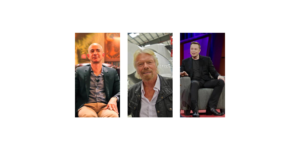In a Time of Mounting Crises, Billionaires Are Holding a Tourism Space Race

The globe is currently facing multiple crises. Not only is the COVID pandemic entering its third delta-driven wave, but the planet is in the midst of a climate emergency, with leading scientists now stating that the Paris Agreement target of keeping temperature rises below 1.5°C is unobtainable.
So, during this rather stark present, with an even bleaker future, three of the globe’s most high-profile billionaires – Elon Musk, Jeff Bezos and long-time celebrity rich lister Sir Richard Branson – have decided it’s prime time to commence a tourism space race.
While COVID-19 virus infections are accelerating in the Global South – and developed nations refuse to allow them cheap access to vaccines – these billionaires are pouring lashings of money into their own personal space travel companies.
And as changing climate is driving devastating heatwaves and wildfires in North America, and unprecedented floods in western Europe, both Bezos and Branson are making the quite remarkable claim that carbon-heavy space travel could be the answer to the climate crisis.
Climate-friendly
Branson blasted off in his Virgin Galactic spacecraft from the US state of New Mexico on 11 July.
According to company chief executive Michael Colglazier, the project is dedicated to “opening up space to all”, with tourists expected to pay a mere $A334,000 for the quick jaunt into outer space.
Virgin Galactic claims the carbon footprint of one rocket trip is akin to a return airflight from London to New York. However, the transatlantic trip by plane is 11,100 kilometres compared with the up and back space trip covering just 160 kilometres.
So, if we look at the company’s comparison in a different light, an aircraft flight produces 0.2 kilograms of carbon emissions per mile, whereas a spacecraft flight leads to 12 kilograms of carbon being released into the atmosphere per mile.
Meanwhile, Bezos, owner of space travel company Blue Origin, was the second billionaire to fund his way into space as his private spacecraft, New Shepard, was launched and made the ten minute journey on Tuesday this week.
Although, to see Elon Musk go into orbit, unfortunately, we’ll have to wait until next year.
Hope for whom
The growing power of billionaires is an issue that’s increasingly being raised. From the onset of the pandemic to last January, Bezos added more than $70 billion to his net worth, while Musk surpassed him by earning $140 billion in pandemic profits.
Many would argue that the democratically elected leaders who govern the nations that these well-known billionaires hail from can’t be trusted to make the right decisions to adequately address the mounting crises humankind is facing.
However, this trio with their ridiculous space race for pleasure purposes seem more concerned with their egos, than grappling with the issues the 99 percent are now facing.
Following his spaceflight, Branson said it was lovely to do something during the pandemic so “kids can be awestruck and they can get excited”.
While Bezos envisages millions of people in space settlements, and Musk tweeted that critics simply don’t understand the hope that space represents for so many.
But the truth of the matter is, these men are investing in space tourism for the rich. Even if the technology was developed to transport humans to another planet, it would only be for the 1 percent to escape the masses. And it certainly won’t be ready before climate destruction grows worse.
Indeed, there’s no answer in space. And humans need to deal with the crises on Earth right now, not develop escape strategies that merely compound them.







